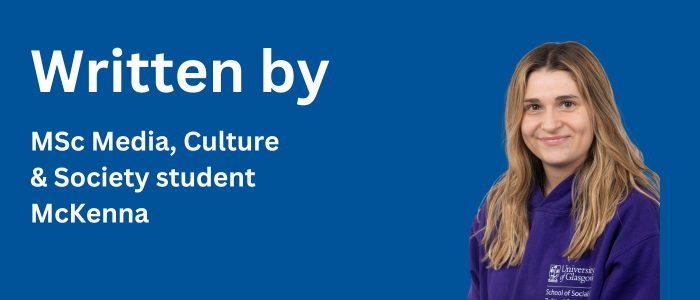My experience with Student Learning Development
Published: 4 April 2025
MSc Media, Culture & Society student McKenna shares how support offered by Student Learning Development helped her with her studies
The beginning
When I moved to Scotland to begin my MSc in Media, Culture & Society at the University of Glasgow, I was excited but overwhelmed. Naturally, starting a new academic journey in a new country brings challenges. Especially when it comes to understanding expectations around coursework that may have different requirements from your previous academics. As an international student from the United States, I quickly realized that academic writing here required a different level of critical thinking and argumentation than I was used to.
That’s where the Student Learning Development (SLD) team came in— they have really made a difference.
The SLD team is made up of sector-leading learning developers, math and statistics advisers, and peer learning advisers. They offer a wide range of workshops, one-on-one sessions, and resources designed to help students thrive academically.
One of my most valuable experiences this year has been attending the SLD Academic Essay Writing Series. These classes aren’t just about grammar or structure; they dig deep into the why and how of university-level writing at Glasgow. They helped me move beyond organizing information. The team helped me advance my critical thinking in response to essay prompts. This support was necessary for students in my programme and across the School of Social & Political Sciences, where critical analysis and original arguments are key.
Essay writing classes
The SLD program includes Essay Writing Classes, a valuable resource for Social Sciences students. These sessions support key academic skills, including essay and dissertation writing, argumentation, engagement with literature and critical source analysis, and even time and project management. These classes are tailored to help meet the University of Glasgow’s academic standards.
Out of the entire series, Class 4 on “argument” shifted how I approach my essays. Led by Dr. Als Torino, the session emphasized that an essay isn’t just a summary of readings or a data dump; it’s an argumentative response to a question. That might sound simple, but for many students (myself included), it was this assistance that made us understand the difference between descriptive and argumentative writing.
In the session, we explored what it means to make a claim, justify it with reasons, and support those reasons with evidence. Without evidence, Dr. Torino explained, “you don’t have an argument—you have an opinion.”
The class also introduced the concept of acknowledgments: anticipating opposing views or limitations in your argument, and addressing them with confidence. As someone studying media and social dynamics, especially complex topics like cancel culture, this has been crucial. Acknowledging nuance doesn’t weaken your argument; it strengthens it.
Why it matters
As a student in the School of Social & Political Sciences, we’re constantly asked to examine contemporary issues—media governance, cultural dynamics, social justice—through a critical lens. The SLD team equips us with the tools to turn our observations and research into compelling arguments. More importantly, they do it in a way that’s approachable and inclusive for all students.
Studying abroad can sometimes feel overwhelming. You have unfamiliar academic norms, you're outside your comfort zone, or you're simply just adjusting to the growth of becoming a new person. It’s okay to need some assistance along the way!
Glasgow's learning support services are right at our fingertips. They ensure that no one falls through the cracks. Whether you’re writing your first master's essay or preparing a dissertation, I highly recommend checking out the resources at Student Learning Development.
The Student Learning Development team offers a wide range of assistance for students. They play a key role in shaping graduates who are prepared. It’s about finding comfort in your new day-to-day, and having a team of advisers helping you isn’t a bad way to start.

First published: 4 April 2025

